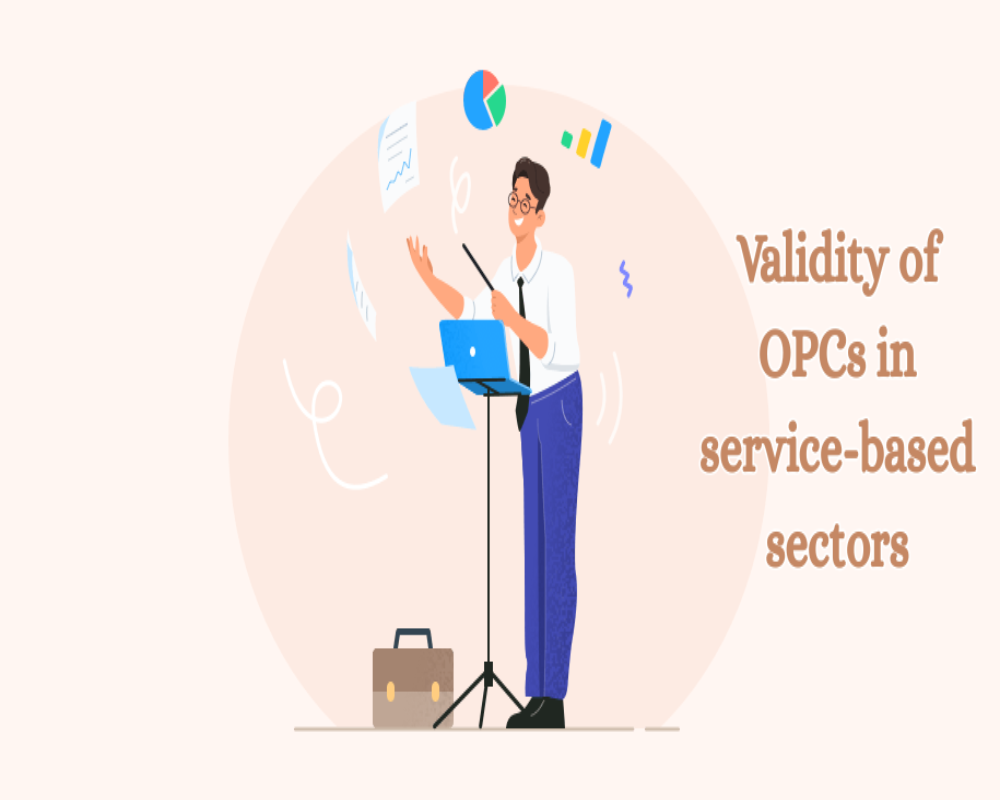Introduction
India’s service sector is one of the largest contributors to GDP and employment, encompassing a wide range of industries including IT services, consulting, education, healthcare, digital marketing, legal advisory, and freelancing. With the rise in solo entrepreneurs, professionals, and startups in this domain, the One Person Company (OPC) structure has emerged as a popular choice for formalizing service-based ventures. Introduced under the Companies Act, 2013, OPCs offer a perfect blend of simplicity, legal recognition, and limited liability. This article examines the validity and appropriateness of OPCs in India’s service-based sectors.
Legally Permitted in Service-Oriented Businesses
The Companies Act, 2013 does not restrict the type of business an OPC can engage in, provided it is lawful and falls within the objects stated in the Memorandum of Association. Therefore, service-based businesses such as software development, design, consulting, coaching, and digital marketing are fully valid and permissible under the OPC framework.
Ideal for Solo Professionals and Freelancers
OPCs are especially valid for independent service providers—such as consultants, web developers, content creators, legal advisors, and chartered accountants—who operate alone but seek a formal business identity. With a single shareholder and limited compliance burden, OPCs allow these professionals to legally operate and grow their ventures.
Suitable for Online and Tech-Based Services
In the digital era, many startups and freelancers offer services through online platforms. OPCs are a perfect fit for these entrepreneurs, providing them with a corporate identity, GST registration eligibility, and banking credibility to expand operations, take online payments, and sign service agreements with larger clients.
Enhances Credibility in the Market
In service sectors, trust and professionalism are key. Clients, especially corporates, often prefer dealing with registered companies over unregistered individuals. An OPC structure lends credibility and formality, increasing business opportunities and enabling participation in tenders, contracts, and vendor listings.
Access to Government Schemes and Benefits
By registering as an OPC, service providers become eligible for benefits under government schemes such as Startup India, MSME registration, and Digital MSME initiatives. These can offer funding support, tax exemptions, skill development programs, and easier access to credit, especially important for small service-based ventures.
Financial and Legal Protection
The OPC structure offers limited liability protection, ensuring that the business owner is not personally liable for company debts. This is highly relevant in the service industry, where legal disputes or financial obligations may arise. The separation of personal and business assets provides a critical safeguard for individual entrepreneurs.
Tax Efficiency and Business Deductions
Service-based OPCs can benefit from corporate tax structures and claim business-related deductions like rent, utilities, software tools, travel, and marketing expenses. This tax efficiency helps reduce net taxable income, especially for high-earning professionals and consultants operating as individuals.
Easy Conversion as the Business Grows
If a service-based OPC scales beyond the turnover or capital threshold, it can be converted into a private limited company, allowing for external investments, team expansion, and equity distribution. This flexibility makes OPCs a strategic starting point for ambitious service startups aiming for long-term growth.
Conclusion
The One Person Company model is highly valid and beneficial for service-based sectors in India. It combines the simplicity of sole ownership with the advantages of a corporate structure, offering legal recognition, financial protection, and market credibility. Whether it’s consulting, freelancing, IT services, or digital media, OPCs empower individuals in the service economy to operate professionally, scale responsibly, and comply with legal and tax requirements with ease. As the service sector continues to grow, OPCs are poised to become a preferred vehicle for independent professionals and service entrepreneurs.
Hashtags
#OPCs #ServiceBasedSectors #BusinessInnovation #Entrepreneurship #Startups #BusinessModels #DigitalTransformation #ServiceIndustry #OperationalExcellence #BusinessGrowth #CustomerExperience #AgileBusiness #SustainablePractices #BusinessStrategy #MarketTrends #ServiceDelivery #Efficiency #BusinessDevelopment #IndustryInsights #FutureOfWork


0 Comments